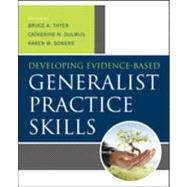
Note: Supplemental materials are not guaranteed with Rental or Used book purchases.
Purchase Benefits
What is included with this book?
BRUCE A. THYER, PhD, LCSW, is Professor and former dean of the College of Social Work at Florida State University. He is the founding and current editor of the bimonthly journal Research on Social Work Practice.
CATHERINE N. DULMUS, PhD, LCSW, is Professor, Associate Dean for Research, and Director of the Buffalo Center for Social Research in the School of Social Work at the University at Buffalo, SUNY, and Research Director at Hillside Family of Agencies in Rochester, New York.
KAREN M. SOWERS, PhD, is Dean and Beaman Professor in the College of Social Work at the University of Tennessee, Knoxville. Her research interests include juvenile justice, sexuality, social work education, child welfare, evidence-based practice, and international social work practice.
Chapter 1 Evidence-Informed Practice
Eileen Gambrill
What is Evidence-Informed Practice?
Three Philosophies of Evidence-Based Practice
Different Kinds of Questions
Different Styles of Evidence-Based Practice
Examples of Evidence-Based Decision Making
Hallmarks and Implications of the Philosophy of Evidence-Based Practice and Care
Educational Implications
Controversies
Obstacles
Conclusion
Key Terms
Review Questions for Critical Thinking
Online Resources
References
Chapter 2 Trauma-Informed Practice
Nancy J. Smyth & Laura Greyber
Overview
Defining Trauma
Risk Factors
Social Work and Trauma
Assessment of Trauma
Interventions for Trauma
Key Words
Review Question for Critical Thinking
Online Resources
References
Chapter 3 - Interviewing Skills
Francis J. Turner
Introduction
Definition
Interviewing as an Art
Interviewer challenges
The Helping Relationship
Techniques or Values
An Ethical Issue
Interviewing Modalities
Other modalities
Use of Interpreters
The setting
The Interview Settings
Technique
Conclusion
Key Terms
Review Questions for Critical Thinking
Online Resources
References
Chapter 4: Problem Identification, Contracting, and Case Planning
Sophia F. Dziegielewski
Introduction
Historical Background
Importance of Evidence-Based Documentation Skills
Using Evidence-Based Principles in Problem Identification and Case Planning
Creating the Problem Statement
Measuring the Problem Behavior
Developing the Service or Case Plan
Record Keeping and the Problem-Oriented Record
Conclusion
Key Terms
Review Questions for Critical Thinking
Online Resources
References
Chapter 5 - Case Management
Valerie Holton and Joseph Walsh
Models of Case Management
Historical Background of Case Management
Summary of Current Evidence-based Information on Case Management
Implications for Social Work on Micro, Mezzo, and Macro Levels
Limitations
Conclusion
Key Terms
Review Questions for Critical Thinking
Online Resources
References
Chapter 6 - Advocacy
Malabika Misty Das, Cheryl Hiu-Kwan Chui, and Cecilia Lai-Wan Chan
Advocacy and Social Work
Definitions and Classifications
Creating Advocacy Culture
Advocacy in Clinical Social Work
Advocacy in Macro Social Work
Multi-modal Strategies and Approaches
National and International Advocacy Movements
Conclusion
Key Terms
Review Questions for Critical Thinking
Online Resources
References
Chapter 7-Crisis Intervention
Kenneth R. Yeager, Albert R. Roberts, and Wendy Grainger
Introduction
Trends in Crisis Intervention
Prevalence and Impact of Emotional Trauma
Historical Background
Roberts' Seven-Stage Practice Model for Crisis Intervention
Summary of Current Evidence-Based and Informed Information on Crisis Intervention
Challenges in Implementing Evidence-Based Practice
Conclusion
Key Terms
Review Questions for Critical Thinking
Online Resources
References
Chapter 8 - Practice Evaluation
Bruce A. Thyer
Brief Background
Evidence-Based Information on Practice Evaluation
Case Studies
The B Design
The AB Design
The ABA Design
The ABAB Design
Multiple Baseline Designs
Alternating Treatment Design
Is There a Hierarchy of Research Evidence?
Limitations of this Approach
Implications for Social Work on Micro-, Mezzo-, and Macrolevels
Conclusion
Key Terms
Review Questions for Critical Thinking
References
Chapter 9: Termination, Stabilization, and Continuity of Care
Samuel A. MacMaster and Sara Sanders
Historical Trends
A Broader Perspective on Service Delivery
Importance of Termination and Stabilization
Stabilization
Case Management, Brief Therapy, and Crisis Intervention
Conclusion
Key Terms
Review Questions for Critical Thinking
Online Resources
References
The New copy of this book will include any supplemental materials advertised. Please check the title of the book to determine if it should include any access cards, study guides, lab manuals, CDs, etc.
The Used, Rental and eBook copies of this book are not guaranteed to include any supplemental materials. Typically, only the book itself is included. This is true even if the title states it includes any access cards, study guides, lab manuals, CDs, etc.